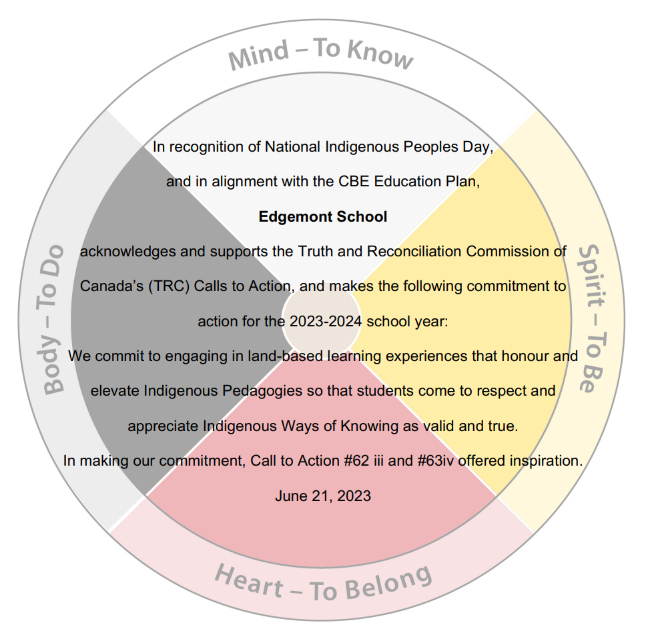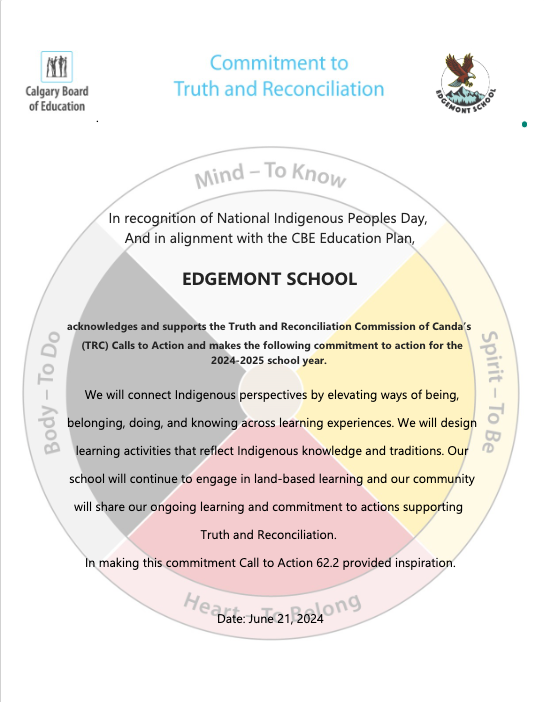Reflecting on our previous TRC commitment:
In 2023-2024 our commitment to the Truth and Reconciliation Calls to action was to engage in land-based learning experiences that honour and elevate Indigenous Pedagogies so that students come to respect and appreciate Indigenous Ways of Knowing as valid and true.
Through our actions we supported teachers to develop confidence and competence in land based learning. Through a “Lift and Shift” model, teacher leaders planned professional development experiences that engaged teachers as learners in lessons they would then recreate with their classes in both the Fall and Winter. Modeled lessons followed by classroom trips were planned seasonally. Later, in the spring, we dedicated teacher release time to plan these land-based trips. Our PD was connected to Indigenous literature and scholarly influences such as Joanne Archibald, and we explored Indigenous Education packages during our dedicated team time. We incorporated two-eyed-seeing through storytelling to weave Indigenous ways of knowing into curriculum topics. We embedded the 4 domains of the Holistic lifelong learning framework in planning for learning and reflections.
All classes land-based trips took at least three trips to Nose Hill with additional trips to the Edgemont Ravine and wetlands resulting in over 100 land-based trips. Additionally, more than 200 volunteer opportunities were created, reconnecting our parents to our school and learning.
We also dedicated a space in the school for circle and gathering artifacts from our land-based learning. This space inspires different ways to engage with classes and shares student and staff reflections on our common experiences. We engaged with Elder Saa’kokoto and members of the Indigenous Education team for inspiration and guidance throughout the year. This engagement enhanced staff understanding and practice of Circle, which is now common in every classroom.
Several classrooms documented their learning on bulletin boards, and teachers contributed classroom experiences to seasonal slideshows and videos shared with our community to celebrate this work.
Impact on Students:
Land-based learning has a profound impact on students, influencing their attitudes, behaviors, and academic performance in several ways:
Land-based learning fosters a strong desire among students to spend more time outdoors. This shift is driven by engaging, hands-on experiences that make learning outside both enjoyable and meaningful.
Engaging with nature enhances students' use of language. They develop a richer vocabulary and more nuanced ways of expressing their experiences and observations. Teachers noted improvements in both oral and written language. Experiencing nature firsthand provides students with rich, contextual experiences to draw from in their writing. Their compositions become more vivid and detailed as they incorporate observations and reflections from their time outdoors.
Students developed connectedness and empathy for Nose Hill. On return trips they noticed changes both natural and caused by human interaction. Their responses show their care and attachment to place. They learn to appreciate the intrinsic value of nature and responsibility to treat the land with reciprocity. Teachers note that students became more mindful of their impact on natural spaces and more respectful of the living organisms.
Students develop greater resilience when it comes to outdoor activities. They become more comfortable with different weather conditions, physical exertion, and the unpredictability of nature. We are starting to notice resilience extending beyond the physical, as students learn to adapt to new situations and overcome challenges in the natural environment. Students learn to navigate and appreciate their environment, which contributes to their overall well-being and sense of independence.
Impact on Teachers
We adopted the approach of walking together on this journey, creating a sense of safety for teachers as we built on a series of modeled experiences for staff and supported experiences for classes. The year-long commitment to land-based learning had a positive overall impact. Reflecting back, we see a wide range of comfort and confidence levels among teachers in implementing land-based learning. Some teachers are very confident in taking their students to learn on the land, while others are more willing but still seek structured support to plan and execute these experiences. Overall, we are all progressing positively.
Teachers have developed greater confidence in utilizing outdoor resources and the physical landscape. By starting as learners themselves, they are noticing new things and experiencing the land in inspiring ways. This beginner's mindset allows them to "lift and shift" their own experiences when leading students. Rooted in storytelling, teachers report feeling more confident in incorporating Indigenous ways of knowing.
In the Gathering Space, we created a setting where the outdoors can be integrated into indoor learning. Our progress in developing this space has been slower than anticipated. However, being thoughtful and reflective has allowed questions to surface and contributed to creating a space that truly represents the Edgemont School community.
Our renewed TRC commitment for 2024-2025
In our renewed TRC commitment for 2024-2025 we will connect Indigenous perspectives by elevating ways of being, belonging, doing, and knowing across learning experiences by designing learning activities that reflect Indigenous knowledge and traditions. Our school will continue to engage in land-based learning and our community will share our learning and commitment to actions supporting Truth and Reconciliation. In making this commitment Call to Action 62.2 provided inspiration.


